What is Nut Fasteners?
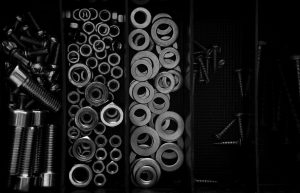
One of the types of a fastener is a nut with a threaded hole. Nuts which are almost always used while joining with a mating bolt to fasten various parts together.
In applications where vibration or rotation may work a nut loose, various locking mechanisms may be employed: lock washers, jam nuts, specialist adhesive thread-locking fluid such as Loctite, safety pins (split pins) or lockwire in connection with castellated nuts, nylon inserts (nyloc nut), or slightly oval-shaped threads.
Download the India Fastener Mobile Application
Square nuts, as well as bolt heads, were the “first shape” made and used to be the most common largely because they were much easier to manufacture, especially by hand. While rare today due to the reasons stated below for the preference of hexagonal nuts, they are occasionally used in some situations when a maximum amount of torque and grip is needed for a given size: the greater length of each side allows a spanner to be applied with a larger surface area and more leverage at the nut.
Learn more about Anchor Fasteners
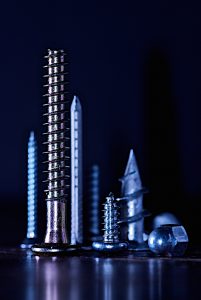
The most basic shape today is hexagonal, for similar reasons as the bolt head: six sides give a good granularity of angles for a tool to approach from (good in tight spots), but more (and smaller) corners would be vulnerable to being rounded off. It takes only one-sixth of a rotation to obtain the next side of the hexagon and grip is optimal.
Polygons with more than six sides do not give the required grip and polygons with fewer than six sides take more time to be given a complete rotation. Other specialized shapes exist for certain needs, such as wingnuts for finger adjustment and captive nuts (e.g. cage nuts) for inaccessible areas.
A wide variety of nuts exists, from household hardware versions to specialized industry-specific designs that are engineered to meet numerous technical standards. Fasteners used in automotive, engineering and industrial applications usually need to be tightened to a specific torque setting, using a torque wrench. Nuts are graded with strength ratings compatible with their respective bolts.
A fastener (US English) or fastening (UK English) is a hardware device that mechanically joins or affixes two or more objects together. Generally, fasteners are used to create non-permanent joints; that is, joints that can be removed or dismantled without damaging the joining components. Welding is an example of creating permanent joints. Steel fasteners are usually made of stainless steel, carbon steel, or alloy steel.
Force may also be used, such as with magnets, vacuum (like suction cups), or even friction (like sticky pads). Some types of woodworking joints make use of separate internal reinforcements, such as dowels or biscuits, which in a sense can be considered fasteners within the scope of the joint system, although on their own they are not general-purpose fasteners.
Furniture supplied in flat-pack form often uses cam dowels locked by cam locks, also called as conformat fasteners. Fasteners can also be used to close a container such as a bag, a box, or an envelope; or they may involve keeping together the sides of an opening of flexible material, attaching a lid to a container, etc. There are also special-purpose closing devices, e.g. a bread clip.
In 2005, it was estimated that the United States fastener industry runs 350 manufacturing plants and employs 40,000 workers. The industry is strongly tied up to the production of automobiles, aircraft, appliances, agricultural machinery, commercial construction, and infrastructure. More than 200 billion fasteners are used per year in the U.S., 26 billion of these by the automotive industry. The “largest distributor of fasteners” in North America is the Fastenal Company.
When selecting a fastener for industrial applications, it is important to consider numerous factors. The threading, the applied load on the fastener, the stiffness of the fastener, and the number of fasteners needed should all be taken into account. See below for material considerations.
Industrial fastener materials –
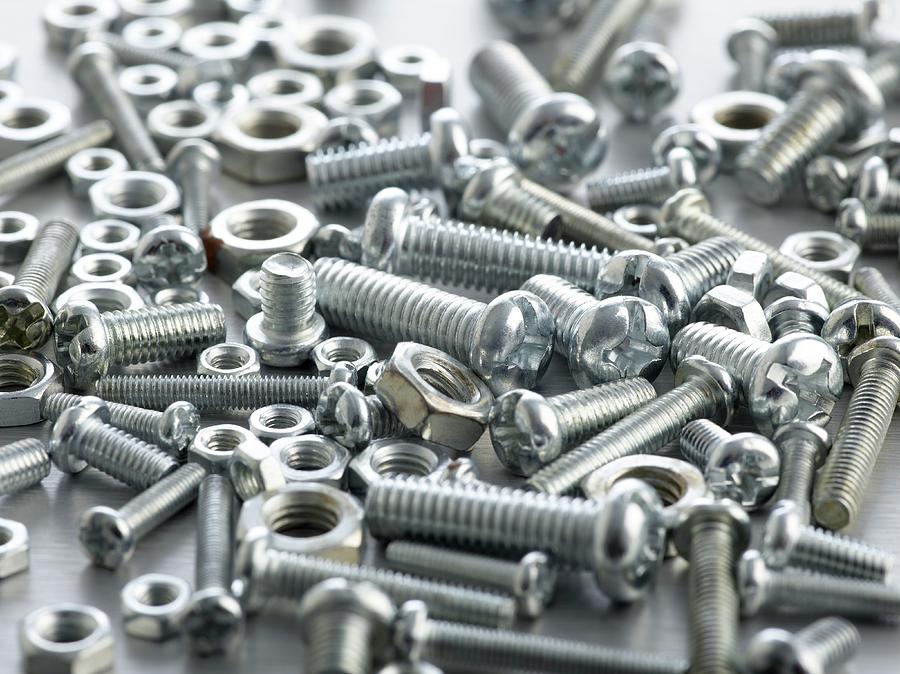
(There are three major steel fasteners used in industries: stainless steel, carbon steel, and alloy steel. The major grade used in stainless steel fasteners: 200 series, 300 series, and 400 series). Titanium, aluminum, and various alloys are also common materials of construction for metal fasteners. In many cases, special coatings or plating may be applied to metal fasteners to improve their performance characteristics by, for example, enhancing corrosion resistance. Factors that should be considered include:
– Accessibility
– Environment, including temperature, water exposure, and potentially corrosive elements
– Installation process
– Materials to be joined
– Reusability
– Weight restrictions
Standards & traceability
ASME B18 standards on certain fasteners
American screws, bolts, and nuts were historically not fully interchangeable with their British counterparts and therefore would not fit British equipment properly. This, in part, helped lead to the development of numerous United States Military Standards and specifications for the manufacturing of mainly any piece of equipment that is used for military or defense purposes, including fasteners. World War II was a significant factor in this change.
A key component of most military standards is traceability. Put simply, hardware manufacturers must be able to trace their materials to their source, and provide traceability for their parts going into the supply chain, usually via bar codes or similar methods.
Type of Nuts, Bolts, and Washers
Understanding the basics
Every fastener performs the same function—mechanically joining and securing two or more parts together. However, differences in type, quality, shape, and material prominently influence the fastener’s speed and service life. Understanding the functional varieties of the different types available, including nuts, bolts, and washers, is essential to choosing the appropriate fastener (and fastener supplier) for your project.
Types of Fasteners
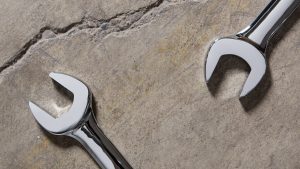
National Bolt & Nut assembles a variety of fasteners, bolts, nuts, and washers.
Types of Bolts
Bolts are one of the most adaptable structural fasteners, available in a vast arrangement of combinations to suit different materials and strength requirements. These fasteners differ primarily in thread specification, length, and head shape, with varying combinations of these features resulting in bolts with different functions.
Some of the types of bolts that we manufacture at National Bolt & Nut include:
• Carriage bolts: This feature a domed shaped head with a square underside that prevents resulting in the post-installation. They are often used with wood and masonry.
• Flange bolts: Flange bolts are a particular type of hex head bolt that contains an integrated flange that serves as a washer component to more evenly divide and further subdivide the load.
• Plow bolts: As like carriage bolts, few plow bolts have a square-shaped countersunk top. Others have a domed design. These bolts are perfect illustrations for heavy-duty applications like industrial machinery.
• Socket Head Cap Screws/ Allen bolt: Socket head cap screws have a flat chamfered top layer along with a smooth or knurled cylindrical sides. Forged heat-treated alloy their illustrations are high strength fasteners intended for the most demanding mechanical applications, with special alloy formulations.
Types of Nuts
Nuts are available in numerous variety of shapes, sizes, components, and thread patterns. While your selection of a nut is somewhat restrained by your selective choice of the bolt—especially in terms of size and threading—should select the nut head shape and material that is most suitable for your application. The varieties of nuts we stock include:
• Coupling nuts: A coupling nut is a longer, cylindrical nut that adjoins two male threads. It can be used to add length to an installation.
• Flange nuts: Identically to flange bolts, flange nuts feature a round flange that acts as an external washer and allowing for an evener load distribution.
• Hex nuts: Hex nuts are shaped hexagonally. These nuts are extremely adaptable but require a pervert for installation. The variety of hex nuts we supply include finished hex, semi-finished hex, hex jam, heavy hex, and slotted hex.
• Locknuts: Locknuts are made available in multiple varieties of shapes and are used to secure other nuts and prevent them from loosening. Types of Locknuts include All Metal Locknuts with Top or Side locking features, Serrated Hex Flange, and Nylon Inserts.

• Slotted nuts: Slotted nuts are designed and constructed into such a way that they can form a locking mechanism with a cotter pin or a safety wire.
• Wheel nuts: Wheel nuts are a broad category of nuts that are used in automotive wheel applications.
However, among the types of the washer, there remain important contrasts. Like nuts, washers should be complementary to your selected bolt and chosen to suit your unique fastening application.
Our range of standard washers includes:
• Beveled washers: Beveled washers are formed with a slightly angled surface, permitting them to join materials that are not parallel to one another.
• Flat washers: Flat washers are the most common type of washer. They provide a larger surface area for better load distribution. Different thicknesses are available for a variety of hold strengths.
• Structural washers: Structural washers are one of the most heavy-duty washer options available. These thick fasteners are designed to withstand the high load pressures of construction.
Other Fasteners
In addition to these three types of fasteners, National Bolt & Nut offers other fasteners—e.g., dowels, hose and shaft couplings, nails, pins, rivets, rods, screws, shackles, and studs— as both stock and custom fastening solutions.
Extra Information about Fasteners
There are numerous factors to consider when selecting a fastener. Other important considerations include understanding how individual fasteners work together to form a joint, use cases, thread patterns, and material and finishing options, providing an employee as an engineer will save money and headache in the long run.
Uses of Fasteners
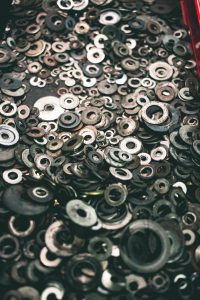
Fasteners find use in a variety of industrial applications, including:
• Agriculture. In the agricultural industry, fasteners are used in field irrigation and filtration systems, drying units, and other farming equipment, buildings, and grain bins.
• Automobile and transportation. Fasteners are used to assemble a wide range of vehicles, including cars, trucks, airplanes, and specialized construction equipment.
• Building and construction. Scaffolding and other support structures used in building and construction applications require copious amounts of fasteners to ensure stability during use.
• Marine. Fasteners employed in the marine industry require excellent corrosion resistance to withstand the long periods of exposure to saltwater that marine decks, ramps, bulkheads, and tanks experience. Materials such as stainless steel and aluminum are commonly used for marine fasteners
• Oil and gas. Similar to military fasteners, fasteners used in the oil and gas industries must provide consistent performance in high stress and corrosive conditions. These fasteners find application in processing equipment such as drilling rigs, tanks, and pumps.
Fastener Material Selection & Plating Guide
Fasteners are available in a wide range of materials and finishes. Choosing the right material and material finish for your fastening application is as essential as selecting the proper type, size, and shape.
The most common fastener materials are aluminum, carbon steel, and other alloys. However, manufacturers also use alternative materials, such as brass and plastic, for fasteners intended for specialized applications. For instance, silicone bronze is appropriate for aquatic environments.
National Bolt & Nut Corp: Your Source For Quality Fasteners
At National Bolt & Nut Corporation, our experience allows us to offer high-quality products and services to meet the fastener needs of a diverse set of industrial clients. We serve industries ranging from construction and transportation to alternative energy and mining, in each case, meeting and exceeding customer requirements.
A Complete Guide on Fasteners.
Types of Fasteners:-
National Bolt and Nut manufactures a variety of fasteners, including bolts, nuts, and washers.
Types of Bolts –
Bolts are one of the most versatile structural fasteners, available in a vast array of configurations to suit different materials and strengths requirements.
Some of the types of bolts that are manufactured at National Bolt and Nut include :
Carriage Bolts
Flange Bolts
Plow Bolts
Hex Head Bolts/ Hex Head Cap Screw
Square Head Bolts
Socket Head Cap Screws
Types of Nuts
Nuts are available in a variety of shapes, sizes, materials, and thread patterns.
The types of nuts we stock include :
Coupling Nuts
Hex Nuts
Lock Nuts
Slotted Nuts
Square Nuts
Wheel Nuts
Types of Washers
Washers are disk-shaped components that provide enhanced control overlocking and friction when used with other fasteners.
These fasteners may also feature teeth, indentations, and other unique structural mechanisms for use in more specialized applications.
Our range of standard washers includes
Beveled Washers
Flat Washers
Lock Washers
Structural Washers.
There are many types of bolts and hardware nuts. Most, if not all, bolt types have machine threads. A threaded bolt screws into nuts to hold or fasten materials together. Bolt types include eye bolts, wheel bolts, and machine bolts while types of nuts include cap nuts, expansion nuts, and u-nuts.
When used together, nuts and bolts work to fasten a stack of parts together securely.

The thin nut should be placed on the bolt first. This nut is typically tightened to between 25% to 50% of the overall tightening torque.
By definition, bolts are threaded fasteners that are intended to be mated with a nut. Here is a gallery showing 12 standard types of bolts. Bolts are threaded fasteners that are intended to be mated with a nut.
The nut should always be stronger than the bolt, so when using higher strength bolts, such as metric class 10.9, make sure to use the correct, corresponding nut. In this case, a class 10 nut would be correct.
A cap nut serves to protect the bolt threads underneath, but also provides a cleaner appearance, and may improve safety on certain joints and applications.
if you are using them put the beveled side down as the pal nut gets a better grip against a flat surface. On curved washers, The beveled side goes down always. We use pal nuts on everything that does not have tension against them like pole top pins and split bolts.
A threaded fastener is a discrete piece of hardware that has internal or external screw threads. It falls into the overall fastener family. They are usually used for the assembly of multiple parts and facilitate disassembly. The most common types are the screw, nut, and bolt.
How it is Made
In mass manufacturing. nuts and bolts are made in 2 steps.
1. Basic shape: The head of the bolt(hex/Allen cap etc) and shape of nut(hex/winged etc) is forged out of metal either by cold or hot forging.
2. Threading: The threading in nuts is either done by Tap or turning depending upon the size and specification. The threading on the bolts is usually rolled or turned or made using Die.
There are three methods for making nut and bolts blanks.
1. By machining operation using bars in it.
2. By Hot forging, we using also bar in it as raw material
Above two processes for low volume bolts
But for mass production, the third one is used which is called cold forging. The raw material used in the coil form for it.
In mass production four processes used
Cold forging, thread rolling, heat treatment and surface treatment.
There are mainly two basic procedures which are followed for manufacturing nuts and bolts.
1.Machining:
In this process different-different procedures are used like turning, milling, grinding or reaming.
2.Forming without cutting:
•Hot forming – Hot forming is mainly used for manufacture large diameter nuts and bolts.
•Cold forming- In this procedure, the binder is formed, usually in multistage processes, by pressure forging, cold extrusion and reducing, or a combination of these procedures
A machine straightens the wire rod and cuts it into pieces. This machine will progressively shape the head of the bolt at one end. It can shape an enormous amount of bolts per minute. After this additional treatment will be needed before the end result.
Bolt head – Progressively formed by forcing the steel into various dies at high pressure. Threading – Threads are formed by rolling or cutting. Heat treatment – The bolt is exposed to extreme heat to harden steel. …
If you look around, almost every big and small object around us is held together with screws, nuts, and bolts. From a smartphone to doors and windows, to cars and ships, how much ever compact or gigantic they are, they all need a fastner to hold them together.
These nuts and bolts are made from what’s called steel wire rods. After spending hours in a furnace to soften it enough to be worked, the wire rods go in a bath of sulphuric acid to remove any rust particles on it, which is then followed by various other procedures to mold it into the desired form.
Top uses of Nut Fasteners
Uses of Fasteners:
In general, fasteners are used to create non-permanent joints; that is, joints that can be removed or dismantled without damaging the joining components. Welding is an example of creating permanent joints. Steel fasteners are usually made of stainless steel, carbon steel, or alloy steel.
Fasteners are basically tools used to join two objects together.
So Basically fastener is a Broader term whereas screw, nut, bolts, rivets, washers, etc are the parts of fasteners.
A fastener or fastening is a hardware device that mechanically joins or affixes two or more objects together. In general, fasteners are used to create non-permanent joints; that is, joints that can be removed or dismantled without damaging the joining components.
Fasteners can be used in various industries such as Automobile, Petrochemical, pharmaceutical, Oil and gas, Rubber, Food processing, heavy machinery and so on.
For the purchase of all kinds of Fasteners in Chennai, people usually go to Broadway. For better quality and insight specs of fasteners, you can visit A.Mohamed & Co in Periyanna Maistry Street. You could reach them at DEHGAMWALA & SONS – DSONS
Uses:
Ranging from the usual household appliances we have used in our everyday life to some high tech gizmos, we have a common component present in them, that’s a fastener. Whatever it may be, right from holding tables and chairs we sit on to automobiles that we travel as each and every edge of what we have used is held in position through a Fastener.
People often make use of Fasteners for non-permanent joints. What do you mean by non-permanent joints? A joint, which could be dismantled or removed without the damage or destruction of joining components, could be referred to as a non-permanent joint.
Specific Types of Fasteners and its Uses
Bolts:
• These are supposed to be threaded lengths made of steel rods with heads on a single end
• Bolts are of four types including carriage bolt, Cap screw, hex bolts, and Plow bolts.
Nuts:
• Nuts are flat steel pieces, usually hexagonal in shape with inner cut threads.
• Hex nuts, Square Nuts and Castle Nuts are some of the commonly used types
Washers:
• Washers are mainly divided into types namely a plain washer or flat washer and split lock washer.
• Plain washers are generally steel disks having a hole in the center.
• These types are used to minimize the stress present in the bolts and buts
• Helical spring washers or lock washers are normally made from tough spring steel and installed under the bolt or nut.
• They are utilized to protect nuts from rotation.
Nails:
• Nails are none other steel rods, which are usually pointed at one end and having ahead at the other end.
• Nails are primarily used to join woods together
• The size of the nail is generally referred in terms of “Penny”
• Common nails, box nails, finish nails; duplex nails and roofing nails are some common types of nails used.
Screws:
• Just like bolts, screws to are threaded lengths of rods made of steel with a head on one end
• The heads of the screw may be slotted, square, cross slotted or hexagonal
Top Manufacturers / Suppliers In India
A fastener is hardware that joins two or more objects mechanically together. The top 10 fasteners company in India catering to the needs of a huge range of manufacturing industries like agriculture machinery, automobile sector, aircraft industry, appliance industry, commercial construction, and infrastructure sector are:
• Sundream group, a leading name, with their corporate office in Noida has been in the infrastructure products and construction services, since 1967. With a team of highly skilled and experienced workforce, it has emerged amongst the leaders in its field. Manufacturing as per international standards, constant monitoring and adherence to strict regulations make “Canon” a name par excellence. Their highly durable, versatile and high-quality fasteners are made from the best grade of mild steel, stainless steel and brass materials in various sizes. The major clients they cater to are NTPC, Delhi Metro, Rapid Metro, DLF, GMR, DDA, L&T, EIL, HCC, PWD, CPWD, NDMC, and the British High Commission are to name a few
• Sundram Fasteners Ltd., Chennai: Started in the year 1966, is another name to reckon with in this high tensile fasteners field. They manufacture a wide range of high-quality fasteners for major precision-driven sectors like automotive, wind energy, aviation, aerospace, farm equipment, and infrastructure sector.
• Daksh Fasteners in Ludhiana, Punjab: A client-centric company, established in the year 2010 are manufacturers, suppliers, and importers of a wide variety of fasteners like Hex bolts, foundation bolts, flat washers, threaded rods and studs, wing nuts, etc.
• Sterling Tools Ltd., Faridabad: With its presence since 1979, manufacture high tensile, high precision fasteners to fit Indian, German, Japanese, American, British standards, are leading suppliers across India, USA, Europe, and the Middle East.
• Kapsons India: Established in 1988, an ISO 9001:2008 certified manufacturer at their Kapsons Industries Ltd. Jalandhar plant is engaged in the manufacture of high-quality fasteners enjoying a vast Indian and global clientele in this field.
• GS Auto International Ltd., Ludhiana was established in the year 1974, a well-known manufacturer and supplier of fasteners to a wide range of Indian and International clients.
• Remax Fasteners Industries (India), Ludhiana: Is a renowned manufacturer of a complete range of fasteners for the heavy engineering, power and railway electric transmission sectors.
• Kova Fasteners Pvt. Ltd., Ludhiana: An ISO9001:2008 company is a leading manufacturer supplying to 29 nations world over a diversified range of fasteners.
The best manufacturers of nuts and bolts are pioneer nuts and bolts and here are reasons for the same:-
1. They have technological agreements with Japan, as a result, you can expect international quality material from them.
2. They supply to some of the best and most critical industries like nuclear power corporation of India ltd, Reliance, L&T, ONGC, BHEL, Samsung Engineering, Delhi metro rail corp.ltd, petroleum development of Oman, Ministry of defense India, Hp(Hindustan petroleum), Indian Oil. These are only some of the few best companies to which this company supplies.
3. This is one of the very few companies that have an in-house laboratory, to test the material and to ensure that you get only the best.
4. Moreover, their bolts are manufactured under tough checks by Indian standard Institute.
5. They are quite disciplined people and deliver the material on time
6. Therefore I would say it is one of the best companies from around the globe.
Nut bolts are a very critical part of any infrastructure you should only buy them from trusted brands. pioneer bolts is a trusted brand and are used by some of the best companies from around the globe.
Top Manufacturers And Suppliers Of Nut Fasteners In the World
Amongst various nut and bolt manufacturers available, but when it comes to the best or largest manufacturer of Nut Fasteners it is Saketh Exim Pvt.Ltd. They are India’s one and only company to have UL Listed and FM approval for pipe hangers and support systems.
They have a Larger dealer network in various Companies. Their products are marketed through a dealer network in various Companies in Gulf countries like UAE, Oman, Qatar, Kuwait, Jordan, Saudi Arabia, Bahrain and Egypt, European countries like the United Kingdom and Spain.
There are several nut & bolt manufacturers in India which are manufacturing various sizes and shapes of nut & bolts.
From the Past few decades, Asian Countries like India and China, European Countries like Germany, UK and Russia, American Countries and many more other countries are widely manufacturing so many types of fasteners majorly with advance technology development and increasing industrial demands. We can’t determine who is the largest one. You can choose based on your location, industrial applications or quality. I would recommend Nuts and Bolts Manufacturer which are providing all types of fasteners according to DIN, EN, ISO, JIS, GOST and many other international standards based on your specifications.
The Hexagon Nuts market report predicts this business space to accrue quite some modest proceeds by the end of the estimated timeline. Inherently, the report is inclusive of details pertaining to the market dynamics – such as the numerous driving forces responsible for impacting the outlook of this industry as well as the myriad risks that this sphere is defined by, not to mention, the innumerable growth opportunities prevalent in the marketplace in question.
Questions which the research study on Hexagon Nuts market answers with respect to the competitive hierarchy of the industry:
- According to the Hexagon Nuts market study, which companies are comprised in the competitive landscape of this business space?
- Among Nobel Precision Metal, Taizhou Changlong Fasteners, U- Bolt, Kiran Industries, Aztech, Haydon Bolts, BUMAX, S Kumar, Roton Products and Dong Tzer Hardware, which one of the firms has been touted to emerge as one of the most remunerative contenders of the Hexagon Nuts market?
- What exactly is market share that each of these companies acquire in the industry?
- What are the important products manufactured by these firms in the Hexagon Nuts market?
- What are the price patterns and profit margins of each company in the Hexagon Nuts market?
Questions which the research study on Hexagon Nuts market answers with respect to the regional hierarchy of the industry:
- Which among the geographies of North America, Europe, Asia-Pacific, South America & Middle East and Africa is most likely to accrue the maximum market share?
- What are the sales statistics and the revenue figures of each of the regions in question?
- How much is the present valuation of each topography and what will the estimated revenue of each region be pegged at?
- What is the anticipated growth rate touted to be registered by each of the regions in the Hexagon Nuts market?
Questions which the research study on Hexagon Nuts market answers with respect to the segmentation of the industry:
- Which among Carbon Steel, Stainless Steel and Other – the various product types, may plausibly amass the maximum returns in the Hexagon Nuts market?
- How much is the market share of each product type in the industry?
- What will the sales statistic of each of the product types in question be, by the end of the projected timeframe?
- Which one among the applications such as Automotive, Machinery, Construction, MRO and Other is anticipated to be the most lucrative segment in the Hexagon Nuts market?
- How much market share does each application segment of the Hexagon Nuts market hold?
- What is the remuneration that every application is likely to procure by the end of the projected period?
Ask for Discount on Hexagon Nuts Market Report at:
In essence, it would be apt to quote that the research study on the Hexagon Nuts market comprises an expansive analysis of this industry space which focuses not just on the geographical scope of this market but also on a plethora of other deliverables such as the market share, revenue estimate, market concentration rate, sales volume, and the market competition trends. Also presented in the report are details with reference to the sales channels that are adopted by myriad manufacturers in a bid to ensure that an accurate method of marketing the product is chosen. Information regarding the contribution of traders as well as distributors in the supply chain are also enlisted in the study.